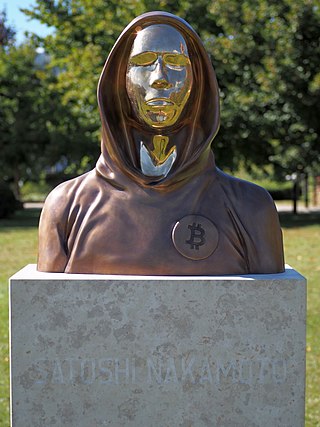
Harold Thomas Finney II was an American software developer. In his early career, he was credited as lead developer on several console games. He later worked for PGP Corporation. He was an early Bitcoin contributor, and received the first Bitcoin transaction from the currency's creator Satoshi Nakamoto.

Bitcoin is the first decentralized cryptocurrency. Nodes in the peer-to-peer bitcoin network verify transactions through cryptography and record them in a public distributed ledger, called a blockchain, without central oversight. Consensus between nodes is achieved using a computationally intensive process based on proof of work, called mining, that guarantees the security of the bitcoin blockchain. Mining consumes large quantities of electricity and has been criticized for its environmental impact.

Satoshi Nakamoto is the name used by the presumed pseudonymous person or persons who developed Bitcoin, authored the Bitcoin white paper, and created and deployed Bitcoin's original reference implementation. As part of the implementation, Nakamoto also devised the first blockchain database. Nakamoto was active in the development of bitcoin until December 2010.

A cryptocurrency, crypto-currency, or crypto is a digital currency designed to work as a medium of exchange through a computer network that is not reliant on any central authority, such as a government or bank, to uphold or maintain it. It has, in a financial point of view, grown to be its own asset class. However, on the contrary to other asset classes like equities or commodities, sectors have not been officially defined as of yet though abstract version of them exist.

The Bitcoin protocol is the set of rules that govern the functioning of Bitcoin. Its key components and principles are: a peer-to-peer decentralized network with no central oversight; the blockchain technology, a public ledger that records all Bitcoin transactions; mining and proof of work, the process to create new bitcoins and verify transactions; and cryptographic security.

Primecoin is a cryptocurrency that implements a proof-of-work system that searches for chains of prime numbers.

Bitcoin is a cryptocurrency, a digital asset that uses cryptography to control its creation and management rather than relying on central authorities. Originally designed as a medium of exchange, Bitcoin is now primarily regarded as a store of value. The history of bitcoin started with its invention and implementation by Satoshi Nakamoto, who integrated many existing ideas from the cryptography community. Over the course of bitcoin's history, it has undergone rapid growth to become a significant store of value both on- and offline. From the mid-2010s, some businesses began accepting bitcoin in addition to traditional currencies.
Nicholas Szabo is a computer scientist, legal scholar, and cryptographer known for his research in smart contracts and digital currency.

Counterparty is a peer-to-peer financial platform and a distributed, open source protocol built on top of the Bitcoin blockchain and network. It was one of the most well-known "Bitcoin 2.0" platforms in 2014, along with Mastercoin, Ethereum, Colored Coins, Ripple and BitShares.

Bitcoin Core is free and open-source software that serves as a bitcoin node and provides a bitcoin wallet which fully verifies payments. It is considered to be bitcoin's reference implementation. Initially, the software was published by Satoshi Nakamoto under the name "Bitcoin", and later renamed to "Bitcoin Core" to distinguish it from the network. It is also known as the Satoshi client. Bitcoin Core includes a transaction verification engine and connects to the Bitcoin network as a full node.
A blockchain is a distributed ledger with growing lists of records (blocks) that are securely linked together via cryptographic hashes. Each block contains a cryptographic hash of the previous block, a timestamp, and transaction data. Since each block contains information about the previous block, they effectively form a chain, with each additional block linking to the ones before it. Consequently, blockchain transactions are irreversible in that, once they are recorded, the data in any given block cannot be altered retroactively without altering all subsequent blocks.

Ethereum Classic is a blockchain-based distributed computing platform that offers smart contract (scripting) functionality. It is open source and supports a modified version of Nakamoto consensus via transaction-based state transitions executed on a public Ethereum Virtual Machine (EVM).

The Lightning Network (LN) is a payment protocol built on the Bitcoin blockchain and those of other cryptocurrencies. It is intended to enable fast transactions among participating nodes and has been proposed as a solution to the bitcoin scalability problem. It is a peer-to-peer system for making micropayments of cryptocurrency through a network of bidirectional payment channels, without delegating custody of funds.

The Bitcoin scalability problem refers to the limited capability of the Bitcoin network to handle large amounts of transaction data on its platform in a short span of time. It is related to the fact that records in the Bitcoin blockchain are limited in size and frequency.
Bitcoin was designed by its pseudonymous inventor, Satoshi Nakamoto, to work as a currency, but its status as a currency is disputed. Economists define money as a store of value, a medium of exchange and a unit of account, and agree that bitcoin does not currently meet all these criteria.
A cryptocurrency wallet is a device, physical medium, program or an online service which stores the public and/or private keys for cryptocurrency transactions. In addition to this basic function of storing the keys, a cryptocurrency wallet more often offers the functionality of encrypting and/or signing information. Signing can for example result in executing a smart contract, a cryptocurrency transaction, identification, or legally signing a 'document'.
In blockchain, a fork is defined variously as:
Wakefield Scott Stornetta is an American physicist and scientific researcher. His 1991 paper "How to Time-Stamp a Digital Document”, co-authored with Stuart Haber, won the 1992 Discover Award for Computer Software and is considered to be one of the most important papers in the development of cryptocurrencies.
Stuart Haber is an American cryptographer and computer scientist, known for his contributions in cryptography and privacy-preserving technologies and widely recognized as the co-inventor of the blockchain. His 1991 paper "How to Time-Stamp a Digital Document”, co-authored with W. Scott Stornetta, won the 1992 Discover Award for Computer Software and is considered to be one of the most important papers in the development of cryptocurrencies.










